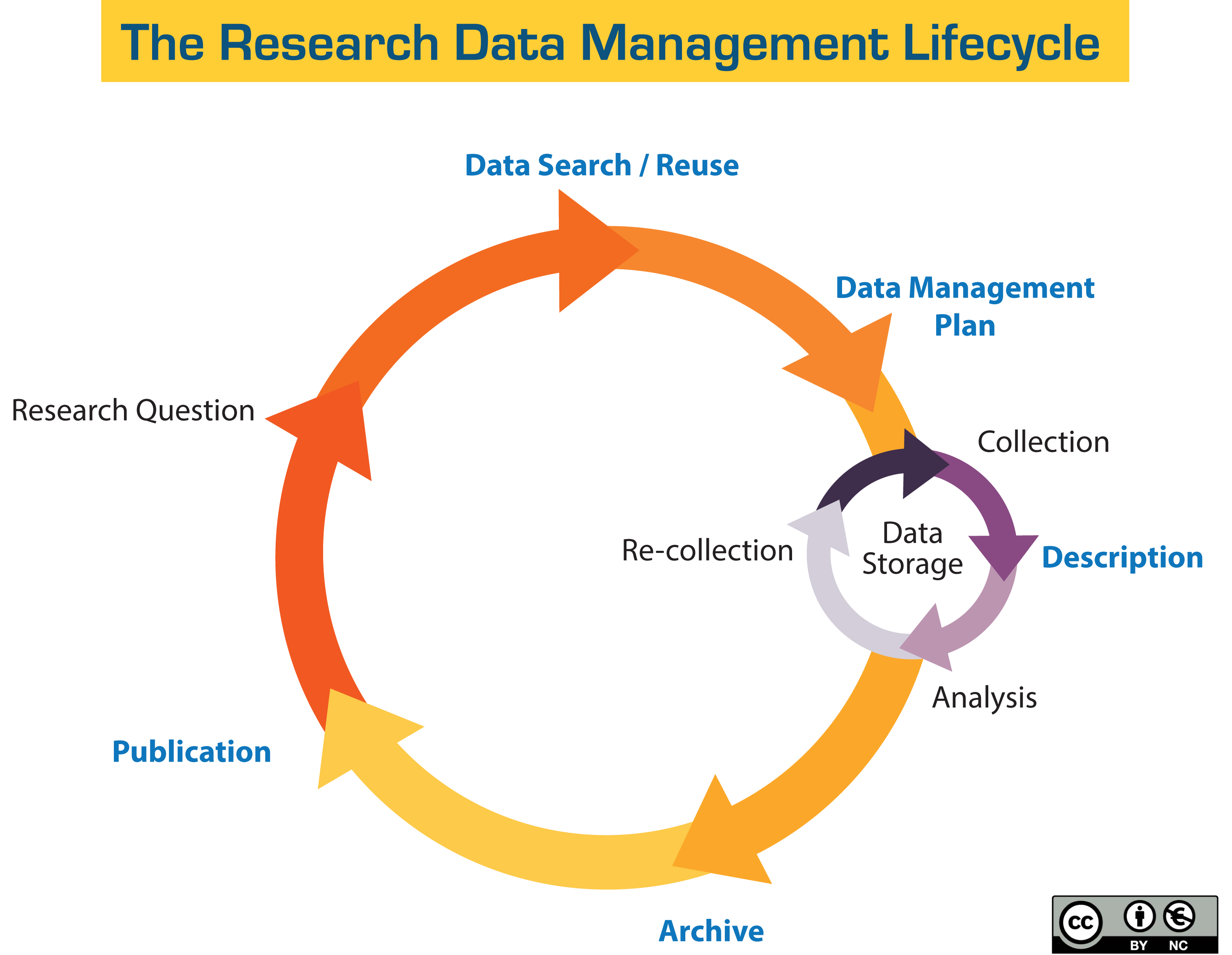Research Data Management
Overview
Teaching: 20 min
Exercises: 75 minQuestions
What is Research Data Management?
Why should a researcher care about data management?
Objectives
Discuss research data
Learn about the research data lifecycle
Discover anti-sharing patterns
Research Data
What is research data? What examples can you think of?
Some reading here: https://ardc.edu.au/wp-content/uploads/2020/01/What-is-research-data.pdf
Research Data lifecycle
Research data lifecycle diagrams give an overview of the stages and processes required for the successful management of data. By showing the different phases a dataset goes through, the data lifecycle concept describes each action as a research project moves from begin an idea to making discoveries and then sharing those discoveries.
This is an example of a research data lifecycle diagram. Is there something surprising in there for you? Or something missing? Where are you at in this cycle right now?

Image credit: UC Santa Cruz University Library
Research Data Management (aka RDM)
Research data management includes a range of activities, all related to how to maintain sound practices around research data collection, organisation and sharing.
More info here: https://staff.mq.edu.au/research/strategy-priorities-and-initiatives/data-science-and-eresearch/research-data-toolkit
What could possibly go wrong? Why RDM?
We’ve all no doubt heard of some data disasters by now - people losing data in different ways, data being shared inappropriately.
Let’s tart with a chat about the kinds of things that happen when researchers wing it.
Challenge - A video on data sharing (30 minutes)
- In breakout rooms, watch this video in small groups: Data Sharing and Management Snafu in 3 Short Acts
- Discuss: Have you run into any of these scenarios? What happened? How should this have gone? Write your room’s conclusions in the etherpad.
- Share: When we get back together, each room should share some of its worst horror stories (with the names changed to protect the innocent).
But rather than being motivated by fear, there are lots of good reasons to be your own best data manager - the one most likely to benefit (and suffer) is you!
Data Management Policies and Plans
Best laid plans
Research data is important! Please take care of it.
Challenge - Responsibilities (5 minutes)
Which of these does NOT count as active research data? Put a +1 in the shared document next to which one you think is right!
- A database
- A research publication
- Field notes
- Audio and video tapes
Solution
A research publication. These are taken care of by publishers. Even when held within an institution, either on open access or for research reporting purposes, these tend to be managed separately from other research data.
Universities around the world have developed a range of policies and procedures outlining their expectations around research data management. Let’s have a look at some university’s RDM statements.
Practice makes perfect. :smile:
Challenge - RDM, status quo (30 minutes)
As a group, choose (at least) one project that one person in your breakout room is running.
Try to answer the following questions in the shared document:
- What backup requirements does your project have? What risks are they protecting against? How confident are you in the backups?
- What data publishing requirements do the funders or universities involved in the project have?
- Follow the “responsbilities of institutions and responsibilities of researchers sections” in the NHMRC’s requirements. How well does the project stack up?
Write your answers in the shared document as a team.
OK. Let’s say that you have suddenly become responsible for an entire team’s research data. If anything happens, it’s on you. What can you do?
Challenge - Arguments for Collaboration (15 minutes)
Take a quick read of Dropbox sharing article.
In the shared document, in breakout rooms, make a single paragraph argument for a team to switch to cloud for collaboration. Make sure you address why which cloud provider they choose, matters.
As everyone: discuss which paragraphs are most persuasive?
Key Points
Research Data Management is the planning and application of a plan to manage the full data lifecycle, from creation to collection and analysis and then to publication and archiving.
A good data management plan will result in more consistent data, less time spent cleaning data, and reusable data that can generate better impact.